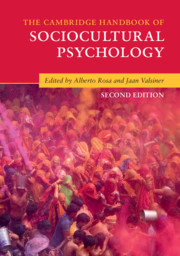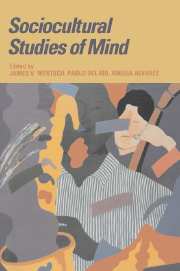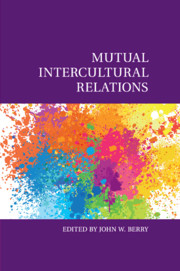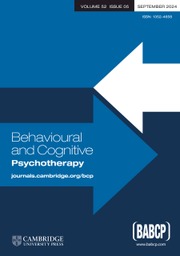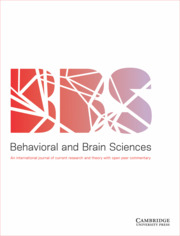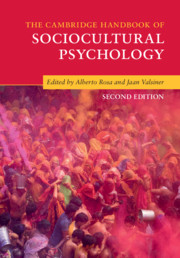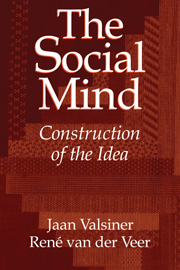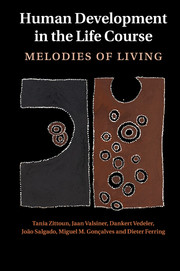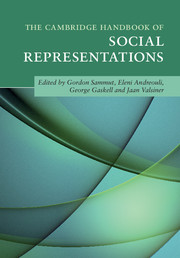The Cambridge Handbook of Sociocultural Psychology
Part of Cambridge Handbooks in Psychology
- Editors:
- Jaan Valsiner, Clark University, Massachusetts
- Alberto Rosa, Universidad Autónoma de Madrid
- Date Published: September 2007
- availability: This ISBN is for an eBook version which is distributed on our behalf by a third party.
- format: Adobe eBook Reader
- isbn: 9780511287220
Find out more about Cambridge eBooks
Adobe eBook Reader
Looking for an inspection copy?
Please email [email protected] to enquire about an inspection copy of this book
-
This book, first published in 2007, is an international overview of the state of our knowledge in sociocultural psychology - as a discipline located at the crossroads between the natural and social sciences and the humanities. Since the 1980s, the field of psychology has encountered the growth of a new discipline - cultural psychology - that has built new connections between psychology, sociology, anthropology, history and semiotics. The handbook integrates contributions of sociocultural specialists from fifteen countries, all tied together by the unifying focus on the role of sign systems in human relations with the environment. It emphasizes theoretical and methodological discussions on the cultural nature of human psychological phenomena, moving on to show how meaning is a natural feature of action and how it eventually produces conventional symbols for communication. Such symbols shape individual experiences and create the conditions for consciousness and the self to emerge; turn social norms into ethics; and set history into motion.
Read more- Includes an editorial introduction and editors' conclusions, which offer suggestions for future developments
- The different sections of the book are self-contained, offering contributions which provide a thorough review of the subject matter
- Provides methodological tools for expanding the empirical knowledge within the field in new areas, avoiding eclecticism
Customer reviews
Not yet reviewed
Be the first to review
Review was not posted due to profanity
×Product details
- Date Published: September 2007
- format: Adobe eBook Reader
- isbn: 9780511287220
- availability: This ISBN is for an eBook version which is distributed on our behalf by a third party.
Table of Contents
Editors' introduction. Contemporary social-cultural research: uniting culture, society, and psychology
Part I. Theoretical and Methodological Issues:
1. The myth and beyond: ontology of psyche and epistemology of psychology
2. Language, cognition, subjectivity - a dynamic constitution
3. Psychology within time: theorizing about the making of sociocultural psychology
4. Sampling reconsidered: idiographic science and analysis of personal life trajectories
Part II. From Nature to Culture:
5. The windowless room: 'mediationism' and how to get over it
6. Functional systems of perception-action and re-mediation
7. Comparative development of communication: an evolutionary perspective
8. The material practices of ape language research
9. The end of myths and legends about biological and cultural evolution: a new view in the knowledge on hominid paleo-ethoecology
Part III. From Orientation to Meaning:
10. Acts of psyche: actuations as synthesis of semiosis and action
11. Time and movement in symbol formation
12. Object use, communication and signs: the triadic basis of early cognitive development
13. Network of meanings: a theoretical-methodological perspective for the investigation of human developmental processes
Part IV. Symbolic Resources for the Constitution of Experience:
14. Dramaturgical actuations and symbolic communication, or how beliefs make up reality
15. Analysis of cultural emotion: understanding of indigenous psychology for universal implications
16. The role of symbolic resources in human lives
17. Perpetual uncertainty of cultural life: becoming reality
18. Prayer and the kingdom of heavens: psychological tools for directivity
19. 'Myself, the project': sociocultural interpretations of young adulthood
Part V. From Society to the Person through Culture:
20. Apprenticeship in conversation and culture: emerging sociability in preschool peer talk
21. The creation of new cultures in peer interaction
22. 'Culture has no internal territory': culture as dialogue
23. Cultural-historical approaches to designing for development
24. Money as a cultural tool mediating personal relationships: child development of exchange and possession
25. The family: negotiating cultural values
Part VI. From Social Culture to Personal Culture:
26. Culture and social representations
27. The institutions inside: self, morality and culture
28. Identity, rights and duties: the illustrative case of positioning by Iran, the United States and the European Union
29. Symbolic politics and cultural symbols: identity formation between and beyond nations and states
30. The dialogical self: social, personal, and (un)conscious
Part VII. Making Sense of the Past for the Future: Memory and Self-Reflection:
31. Social and cognitive determinants of collective memory for public events
32. Collective memory
33. Issues in the sociocultural study of memory: making memory matter
34. The social basis of self-reflection
General conclusions.Instructors have used or reviewed this title for the following courses
- Activity Systems Analysis Methods
- Contemporary Art Theory
- Learning Design & Technology Seminar
- Learning and Sociocultural Theory
- Multicultural Awareness
- Workshop: Activity theory and activity systems analysis in educational research
Sorry, this resource is locked
Please register or sign in to request access. If you are having problems accessing these resources please email [email protected]
Register Sign in» Proceed
You are now leaving the Cambridge University Press website. Your eBook purchase and download will be completed by our partner www.ebooks.com. Please see the permission section of the www.ebooks.com catalogue page for details of the print & copy limits on our eBooks.
Continue ×Are you sure you want to delete your account?
This cannot be undone.
Thank you for your feedback which will help us improve our service.
If you requested a response, we will make sure to get back to you shortly.
×

